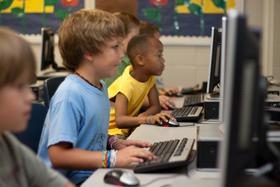A new school year is filled with excitement and expectation for most children, but for those who are unsure whether they are prepared for the next grade, the time can also be filled with worry and trepidation. How can parents know definitively their children are ready to advance to the next step of their academic careers? There are several signs to watch for and many more tips parents can use to get their kids started on the right foot when the new school year begins.
Getting Started in Early Education – Separation, Focus, and Reading
The early years of school are an exciting time for children, but they can also be scary for some. To ensure your child is ready to enter the hallowed halls of academia, consider the following:
- Leaving Mom and Dad – Is your child ready to say goodbye to you every morning? If not, begin breaking those attachment ties down by enrolling your tot in a preschool or church program. According to Family Education, children entering Kindergarten should be happy away from home and be able to handle basic needs like bathroom trips on their own.
- Focusing on Tasks – Throughout the early years of school, children must learn to focus on tasks and see them through to completion. This process begins in Kindergarten with “circle time” and cut and paste projects and continues through first and second grade, with reading groups, math tests, and writing practice. Great Schools recommends giving children simple chores during these years to hone those “on-task” skills.
- Becoming a Reading Machine – Reading skills learned in the early grades take students through their higher education experience. Help your child develop these skills by reading out loud together, spending time at the local library, and working on letter and sound recognition.
These are skills to work on with your child, but they can also provide warning signs that your child may not be ready to advance to the next level. Talk to your child’s teacher if you have any concerns about necessary skills your child may be lacking as soon as possible, which will get your child the help he or she needs to prepare for the next phase.
This video offers some tips for preparing for the new school year.
Cruising through the Primary Years – Memorization, Research, and Writing
Throughout the latter part of elementary school, academics, and social interactions begin to collide on a much higher level in anticipation of the middle school years that are coming. This can be an intense time for students, with greater demands in the classroom.
- Memorizing Facts – Great Schools cites memorizing facts as an important skill for a fourth grader to master. Children are expected to begin studying for tests at this age, developing skills and discipline that will take them far into the future.
- Researching Topics – As children begin to embark on group and individual projects, research skills come into play. While active reading is an important component of this ability, it is also helpful to know where to get information – through the library or the Internet.
- Becoming an Author – Scholastic recommends using this time to help your child develop as a writer by letting him, or her see what you write, correcting spelling and grammar mistakes, and encouraging your child to use the computer to create his or her written masterpieces.
These skills are necessary for a successful middle school experience. Children who begin to struggle during the latter elementary years may require the assistance of a professional tutor to get them up to par for the next step in the academic process.
Preparing for Middle School – Study Habits, Socialization, Self-Discipline
By middle school, many of your child’s academic skills have bloomed. This is the time to hone those skills while helping your teen student deal with this phase's social and emotional challenges.
- Developing Study Habits – Study habits begin with organization skills that will take your student through the rest of his academic career. Education.com recommends that all middle schoolers have a planner, homework folder, calendar, and email addresses for teachers to begin the year.
- Understanding Socialization – At this age, it is important for a teen to feel comfortable with herself as an individual while establishing a feeling of belonging within a group. Clubs, sports, and other extracurricular activities may help the young teen find her niche.
- Nurturing Self-Discipline – Middle schoolers need to learn self-discipline, keeping up with chores and schoolwork without a parent hounding them to complete tasks. Oversee your child’s workload to offer guidance without taking on the responsibility yourself.
This video offers more suggestions for the beginning of the school year.
Is Retention Right for Your Child?
Throughout the school years, some parents may be confronted with the idea that their child is simply not ready to advance to the next level. While there are many negatives associated with the idea of holding a child back, there are some factors that may warrant a retention decision in some circumstances.
Wrights Law explains that retained children are likelier to drop out of school before graduation. However, those who are passed ahead unprepared may exceed their frustration level the following year, opening the door to a host of school issues.
The school years are filled with milestones, relationships, and learning opportunities. By ensuring your child is ready for each step of the process, you can rest assured your young student is given the greatest odds for success.
Questions? Contact us on Facebook. @publicschoolreview















